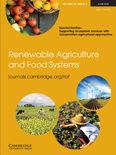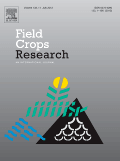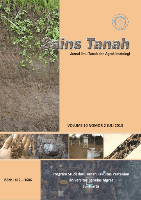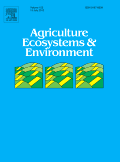
Agricultural & Environmental Letters
Scope & Guideline
Championing impactful research in agronomy and environmental science.
Introduction
Aims and Scopes
- Soil Health and Management:
The journal emphasizes research on soil health, including the effects of various agricultural practices such as cover cropping, no-tillage, and organic amendments on soil quality and ecosystem services. - Sustainable Agricultural Practices:
Research focusing on sustainable agriculture methods, including precision agriculture, integrated pest management, and nutrient management practices that minimize environmental impacts while maximizing productivity. - Impact of Climate Change:
The journal covers studies on how climate change affects agricultural systems, including changes in crop yields, soil health, and the efficacy of adaptation strategies. - Innovative Agricultural Technologies:
There is a strong focus on the application of new technologies, such as artificial intelligence and remote sensing, to improve agricultural practices and environmental management. - Interdisciplinary Approaches:
The journal encourages interdisciplinary research that integrates agricultural sciences with environmental science, economics, and social sciences to address complex agricultural challenges.
Trending and Emerging
- Artificial Intelligence in Agriculture:
There is a growing interest in the application of artificial intelligence and machine learning techniques to enhance agricultural practices, optimize resource use, and improve decision-making processes. - Soil Health Indicators and Assessment:
Research on innovative soil health indicators and assessment methods is trending, reflecting an increasing recognition of soil health as a critical factor in sustainable agriculture. - Circular Economy in Agriculture:
The exploration of circular economy principles, particularly the utilization of agricultural byproducts and waste management strategies, is emerging as a vital theme for promoting sustainability. - Water Quality and Conservation Practices:
Studies examining water quality impacts and the effectiveness of conservation practices, particularly in relation to nutrient runoff and irrigation strategies, are becoming increasingly prevalent. - Public Engagement in Agriculture:
Research focusing on public perceptions and engagement with agricultural practices, particularly in relation to soil conservation and sustainability, is gaining importance as a means to bridge the gap between science and community action.
Declining or Waning
- Traditional Fertilizer Management Practices:
Research papers centered on conventional fertilizer management are becoming less prominent, as there is a growing shift towards exploring organic amendments and sustainable practices. - General Crop Production Studies:
There is a waning emphasis on generic studies related to crop production without specific environmental considerations, as the journal increasingly prioritizes research that connects agricultural practices with environmental impacts. - Single-Crop Systems:
Research focused on single-crop systems is declining, reflecting a broader trend towards promoting crop diversity and integrated farming systems that enhance resilience and sustainability.
Similar Journals

International Journal of Plant Production
Innovating solutions for sustainable plant production systems.International Journal of Plant Production, published by SPRINGER in Switzerland, serves as a leading platform for the dissemination of innovative research in the fields of Agronomy, Crop Science, and Plant Science. With an ISSN of 1735-6814 and an E-ISSN of 1735-8043, this journal has maintained its reputation by achieving a Q2 quartile ranking in both categories as of 2023, alongside notable Scopus rankings placing it in the top quartiles of its fields (Rank #105/516 and Rank #88/406, respectively). The journal's scope encompasses a wide array of topics vital to sustainable agriculture and plant production systems, making it a critical resource for researchers, professionals, and students striving for advancements in these disciplines. By fostering open scientific dialogue and supporting cutting-edge research, the International Journal of Plant Production is committed to contributing to the resolution of global food security challenges, enhancing agricultural practices, and promoting ecological sustainability.

Revista de Agricultura Neotropical
Advancing Tropical Agriculture Through Open Access ResearchRevista de Agricultura Neotropical, published by UNIV ESTADUAL MATO GROSSO SUL, serves as a pivotal platform for disseminating research in the fields of agronomy and crop science. Since its inception as an open-access journal in 2014, it has been dedicated to promoting innovative research and practical applications within the agricultural sector, specifically tailored to the challenges and dynamics of the tropical agriculture landscape in Brazil and beyond. Although currently positioned in the Q4 quartile of Scopus rankings, and with a modest agricultural science percentile, the journal actively encourages contributions that highlight sustainable agricultural practices, tropical crop management, and emerging technologies in farming. With its commitment to open access, the Revista de Agricultura Neotropical broadens the reach of critical knowledge, making it accessible to researchers, professionals, and students alike, thus fostering a collaborative environment for advancing agri-scientific initiatives.

Agronomy for Sustainable Development
Empowering Research for a Greener FutureAgronomy for Sustainable Development, published by SPRINGER FRANCE, is a leading international journal dedicated to advancing the field of agronomy and sustainable practices. With its ISSN 1774-0746 and e-ISSN 1773-0155, this esteemed journal plays a pivotal role in disseminating cutting-edge research and innovative solutions that address critical challenges in agriculture and environmental engineering. Achieving remarkable rankings in Scopus—specifically, 19th out of 406 in Agronomy and Crop Science and 22nd out of 197 in Environmental Engineering—underscores its prestige, with a remarkable 95th and 89th percentile respectively. The journal is open access, promoting broader dissemination of knowledge, and welcomes contributions that foster sustainable agricultural practices and enhance environmental stewardship. As an essential resource for researchers, professionals, and students, Agronomy for Sustainable Development serves as a platform for interdisciplinary collaboration aimed at nurturing resilient agricultural systems and promoting sustainability worldwide.

Romanian Agricultural Research
Elevating Agricultural Insights for Tomorrow's ChallengesRomanian Agricultural Research is a prominent academic journal dedicated to advancing the field of agricultural science with a specific focus on agronomy and crop management. Published by the NATL AGRICULTURAL RESEARCH & DEVELOPMENT INST in Romania, this journal has established itself as an important resource within its discipline, evidenced by its Q3 ranking in the Agronomy and Crop Science category for 2023. With its ongoing publication since 2008, the journal provides a platform for researchers and professionals to disseminate their findings and share innovative practices that address the challenges faced in agricultural development. Although it operates under a non-open access model, Romanian Agricultural Research commits to rigorous peer-review processes, ensuring the high-quality content that enhances the academic community’s knowledge base. The journal's objective is to foster dialogues surrounding sustainable agriculture, improve crop yield, and contribute to the enhancement of agricultural practices globally. Researchers, professionals, and students will find this journal to be an invaluable repository of knowledge and a catalyst for future agricultural innovations.

RENEWABLE AGRICULTURE AND FOOD SYSTEMS
Pioneering interdisciplinary approaches to food sustainability.RENEWABLE AGRICULTURE AND FOOD SYSTEMS, published by Cambridge University Press, is a leading open-access journal dedicated to the advancement of sustainability in agricultural practices and food systems. With an ISSN of 1742-1705 and an E-ISSN of 1742-1713, this journal spans the interdisciplinary fields of agronomy and food science, achieving a commendable Q2 ranking in both categories for 2023. As it continues to converge through the years from 2004 to 2024, the journal offers a platform for researchers, professionals, and students to disseminate transformative research that addresses the challenges of food security, resource management, and environmental impact. The journal’s significant impact is underscored by its Scopus rankings, situating it in the 77th percentile among agronomy and crop science publications, and the 67th percentile in food science. Since becoming fully open access in 2023, RENEWABLE AGRICULTURE AND FOOD SYSTEMS promotes wider accessibility to vital research findings, fostering collaboration and innovation in the pursuit of sustainable agricultural practices and food systems worldwide.

FIELD CROPS RESEARCH
Transforming Agricultural Practices with Groundbreaking StudiesFIELD CROPS RESEARCH is a premier academic journal published by Elsevier, dedicated to advancing knowledge in the fields of Agronomy and Crop Science as well as Soil Science. Now in its 46th year of publication, this esteemed journal has established itself as a leading resource, holding a prestigious Q1 ranking in both the Agronomy and Soil Science categories, with a remarkable blend of rigorous peer-reviewed research and innovative findings. With a Scopus ranking of #27/406 in Agronomy and #20/159 in Soil Science, and a notable 93rd and 87th percentile respectively, FIELD CROPS RESEARCH plays a vital role in informing practices that drive sustainable agriculture and optimize crop production. Although not an open access journal, it remains highly accessible to the global research community and offers critical insights that influence policy and agricultural practices worldwide. Researchers, professionals, and students are encouraged to delve into this journal, as it continues to shape the future of field crop research through impactful studies and comprehensive reviews.

Egyptian Journal of Agronomy
Advancing Agricultural Science for a Sustainable FutureEgyptian Journal of Agronomy, published by the NATL INFORMATION DOCUMENTATION CENT, ACAD SCIENTIFIC RESEARCH & TECHNOLOGY, serves as a pivotal platform for researchers, professionals, and students focusing on various disciplines within the agricultural sciences, including agronomy, soil science, horticulture, and ecology. With an ISSN of 0379-3575 and E-ISSN of 2357-0288, the journal aims to bridge the gap in knowledge and innovation in the field with its comprehensive studies and frameworks. While the journal is currently categorized in low Scopus ranks, indicating immense potential for growth in influence and impact, it remains dedicated to providing quality research and fostering advancements in agronomic practices. Set in Egypt, a hub for agricultural research, the journal is committed to reflecting the regional and global challenges in agriculture. The Egyptian Journal of Agronomy is a vital resource for anyone engaged in the evolving landscape of agricultural science, offering insights that promote sustainable practices and address current issues facing the sector.

SAINS TANAH
Connecting Local Insights with Global Environmental ChallengesSAINS TANAH is a renowned peer-reviewed journal that focuses on the fields of agronomy, soil science, and environmental studies, published by Universitas Sebelas Maret Surakarta in Indonesia. Established as an Open Access platform since 2001, it aims to disseminate high-quality research that addresses critical issues in soil health, crop management, and pollution, thereby fostering sustainable agricultural practices. With its current impact factor demonstrating a Category Quartile ranking of Q3 and Q4 in major areas such as Agronomy and Crop Science, Atmospheric Science, and Pollution, SAINS TANAH serves as an essential resource for researchers, professionals, and students dedicated to advancing knowledge and solutions in these vital fields. By providing a collaborative environment and upholding rigorous academic standards, the journal not only highlights the significance of Indonesian research contributions but also aims to connect local insights with global agricultural and environmental challenges.

AGRICULTURE ECOSYSTEMS & ENVIRONMENT
Innovating Research for a Greener TomorrowAGRICULTURE ECOSYSTEMS & ENVIRONMENT is a premier journal published by Elsevier, specializing in the fields of agronomy, animal science, and ecology. With an impressive impact factor reflective of its stature, it ranks in the top quartile (Q1) across three significant categories, highlighting its critical role in advancing research within the agricultural and environmental sciences. The journal serves as a vital platform for disseminating high-quality research that addresses the complex interactions between agriculture and ecosystems, providing insightful methodologies and findings that inform sustainable practices. As the journal continues to converge from 1983 and through to 2025, it remains committed to offering both traditional and innovative access options while contributing to the academic community's understanding of pressing environmental challenges. Researchers, professionals, and students are encouraged to engage with the journal's comprehensive content, which is positioned among the elite in its fields, having achieved top rankings in Scopus across relevant disciplines.

Frontiers in Agronomy
Connecting Ideas, Enhancing Crop ProductivityFrontiers in Agronomy, published by FRONTIERS MEDIA SA, is a premier open-access journal dedicated to the dynamic field of agronomy. Launched in 2019, it has rapidly established itself as a leader in the publication of groundbreaking research, holding a distinguished Q1 ranking in several categories including Agricultural and Biological Sciences, Agronomy and Crop Science, Plant Science, and Soil Science as of 2023. With an impressive Scopus ranking that positions it among the top journals in its field, this journal provides a valuable platform for researchers, professionals, and students alike to disseminate and access innovative research and critical insights in agronomy. Every contribution to Frontiers in Agronomy undergoes rigorous peer review, ensuring that high-quality research remains at its core. Accessible to all since its inception, it serves as a vital resource for advancing knowledge and fostering collaboration within the global agronomic community, supporting the quest for sustainable agricultural practices and enhanced crop productivity.